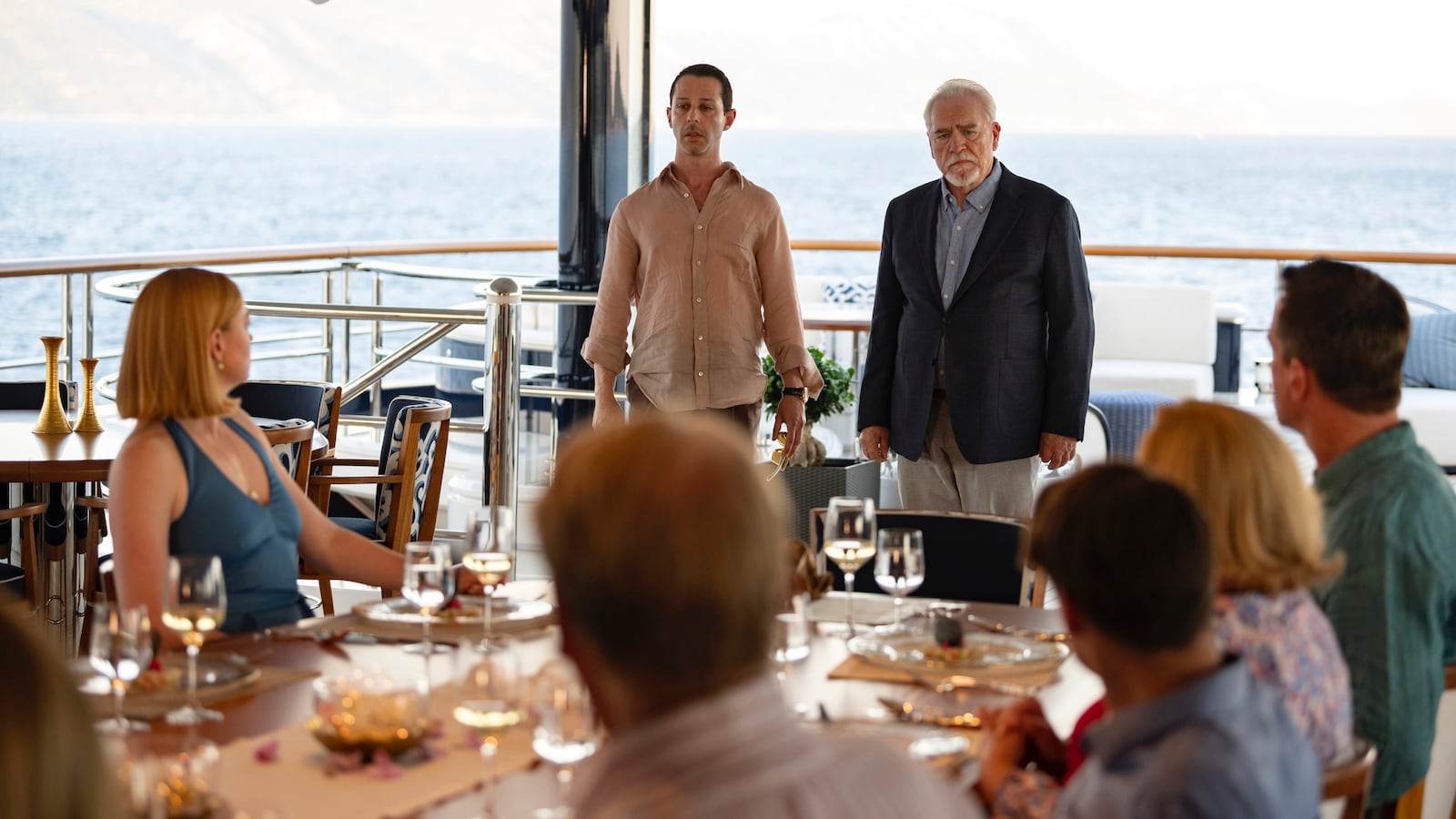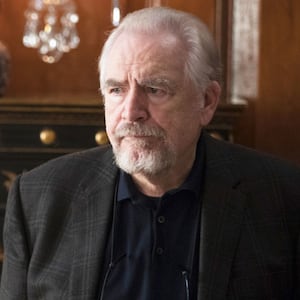The blood sacrifice shouldn’t have been gratifying. There’s no way it could have been.
The slaughter was set in motion in last week’s penultimate episode of Succession season two, whose Sunday-night finale could only be described as elegantly explosive.
One of the Roys had to fall on the sword, be the proverbial lightning rod in the company’s shitstorm of controversies, submitting themselves to a frying by its various bolts of malfeasance. It set up a clever parlor game, with the last week leading up to the finale hosting a water-cooler debate over who the scapegoat should be—or, more importantly, would be.
But, again, no answer would be satisfying. No sacrifice, when you think about it, really, truly worked. Passionate fan theorizing was a funhouse mirror of events in Sunday’s actual episode. Kendall suggests Gerri take the fall. Roman suggests Frank. Frank fingers Karl. Karl brings it back to Gerri. Roman offers up Tom “with Greg sprinkles.”
As the world’s most depressing yacht-deck brunch concluded, it was clear that there was no good option for Logan and the company. And for fans, bloodthirsty as we were for the eventual downfall of one of the extended clan, we knew it couldn’t be any of those choices, too.
Those same fans, however, probably weren’t braced for the episode to transform into a staging of The Godfather on the set of Below Deck: Mediterranean (side note: a genre mash-up I never knew I needed) as the jaw-dropping final act crescendoed to a stirring, shocking conclusion.
(WARNING: Spoilers ahead.)
Logan chose Kendall. After his star performance at the congressional hearing, he’s now the most visible face of the scandal. He has a history of being publicly embroiled in Waystar Royco scandal. On paper, he’s the perfect fall boy for the company. As television, he’s the dignified choice: emotional enough that it carries a faint whiff of surprise, perhaps inevitable enough to not piss anyone off completely.
Kendall succumbs to his fate with a quiet, sad resignation. He’s simmering with so much pathos that you can’t possibly see what’s coming next; you’re too distracted by empathy. As he greets the firing squad, beginning his press conference and pausing with a pregnant, “But…” you hesitate, too. Could he possibly… No, no he wouldn’t… There’s no way… Then he does it.
Just as the executioner is about to strike, he tosses a grenade, going off-script and throwing all the blame on his father. Once again, he is making a play for his own takeover, patricide be damned.
It’s an exquisite mirror to the events of the season one finale, and a scorching end to one of the strongest second seasons of television in recent memory. Succession isn’t a show that’s for everyone. But for those who were drawn in by its sumptuous, one-percent savagery, it was an exceptional episode of television that boasts an all-time-great finale twist.
It goes beyond that last act, too. The long-overdue reckoning of Shiv and Tom’s relationship was suitably cathartic and awkward—and strangely beautiful. Why would Tom subject himself to their unbalanced dynamic, if not just for power-by-proxy? He tells her, finally, that he wonders if “the sad I’d be without you may be less than the sad I get from being with you.” For all the vices that approach being fetishized on this show, the line is a jarring reminder of its cleverly quiet, melancholic and romantic undercurrent.
And Shiv’s season-long arc—a makeover of confidence and fierce fashion—gets the same sheepish stalling suffered by Kendall last season. Two seasons are hardly enough to establish a pattern, but we seem to be setting up for another cycle: Next year, is it Roman’s turn to be tipped for the crown, only to stumble before reaching the throne?
The beauty of Succession lies in how dangerously it tilts toward ridiculous, precarious leaps of tone and writing that would be caricature were there not such rich world-building and tangible stakes planted—no matter how unrelatable and even infuriating, in the year 2019 against our sociopolitical backdrop, those stakes may be. It’s a strange form of empathy that’s mined. These are characters trying to get a grip on a reality that money took them out of, but now circumstances are tugging them down to, unfamiliar as it may be.
The benefit of that tightrope of outrageousness is an eagerness to embrace the thrill. So when Logan quotes ancient mythology to symbolically throw his son to the wolves, you don’t cringe, you damn near applaud.
He recounts a story he heard from Marcia. (The one downside of the finale: We never got to see Marcia break bad.) “The Incas, in times of terrible crisis, would sacrifice their child to the sun. I said to her they were a bunch of fucking savages. Her thing was, what could you possibly kill that you love so much that it would make the son rise again?”
Imagine if that’s how you found out that your father has decided you were going to go to jail for his sins? But it works. Everything that was almost exceedingly extra worked in the episode. “Extra” is the Succession aesthetic.
Kendall asks Logan if he ever thought he could have succeeded in taking over the company, as once planned. “You’re not a killer,” Logan says. “You have to be a killer. But nowadays, maybe you don’t.” It’s a brilliant, damning, and concise summation of our modern crossroads of power, status quo, and resistance.
When Kendall kisses him on the cheek, it’s heartbreaking, sweet, and maybe a little pathetic. Fast-forward a few minutes, and you realize it reaches Fredo levels of poignant badassery. With a kiss, he betrays his father, marking him for death.
It’s glorious that we get to watch Logan watch Kendall ruin him. “This is the day his reign ends,” Kendall says at the press conference, as we watch a slight, knowing smile creep across Logan’s face.
What is the smile? Was this part of Logan’s plan? He looked strangely calm, considering that he’s historically been the human equivalent of a powder keg. Or is it a smile of pride? His son is the killer after all. He finally ascended.
It’s all so good. We thought we were on the march toward a killing; we didn’t expect to be ambushed at the end. There’s a kind of adrenaline that we’ve come to associate with these prestige cable dramas centered around the scariest protagonists and antiheroes there are: rich white people.
Succession juggles the themes that are on our minds constantly these days, frustrating and depressing us on an eternal loop: wealth and privilege, power and corruption, political cronyism, culpability, misogyny, the media and spin, capitalism and commodity, sex, entitlement, and dynastic chokeholds. But rather than expose or skewer these things in a way that would at face value seem satisfying, Succession practically sanctifies them.
It’s a clear-eyed look at the dynamics of this particular kind of circus, embellished through a bit of Shakespearean dialogue and memeable set pieces. (The best decision season two made was to drop each episode in the middle of some grandiose, outrageous setting: boar hunting in Hungary, testifying before Congress, a tribal council on a Mediterranean yacht.)
But for all the show’s outlandishness, it’s played thematically rather straight. It champions these characters as much as it damns them. It’s presenting them without judgment, which actually has the effect of opening them up to even greater judgment than if there were any sort of moralizing or pandering going on, or soapboxes being stacked.
Lunacy rarely seems this assured and controlled. What a great season of TV.


